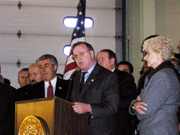Acting Gov. Richard Codey held a press conference Wednesday afternoon in Jersey City to address the cuts in federal Homeland Security funding that will have an impact on New Jersey.
What prompted Codey to speak was what he has called “a sucker punch to New Jersey” – information that there would be cuts in Homeland Security money going to key cities such as Jersey City and Newark, a result of decreased funding to the federal Department of Homeland Security for the upcoming fiscal year.
In the case of New Jersey, Newark went from receiving $14.9 million in 2004 to 12.6 million this year, suffering a 17 percent decrease, and Jersey City saw its Homeland Security money slashed from $17 million to $6 million, a dramatic 60 percent.
The money is used to train security task forces and for equipment and software.
However, New York City saw its monies increased by 344 percent and Washington D.C. by over 160 percent.
New Jersey will receive a total of over $60 million in homeland security money for the fiscal year 2005.
Codey was surrounded by various state and local officials, including Jersey City Mayor Jerramiah Healy, Hudson County Executive Tom DeGise, and Bayonne Mayor Joseph Doria, at the Jersey City Emergency Operations Center on Summit Avenue.‘Sucker punch’
Codey met with state and local officials regarding the cuts before taking the podium.
“This, without question, was a sucker punch to New Jersey,” Codey said. “These cuts are a threat, not just to New Jersey, but to our nation as a whole.”
Codey went on to emphasize how cuts will impact training for first responder personnel and the purchase of equipment and vehicles. Codey also said that he would seek a meeting with the newly appointed czar of Homeland Security, Bernard Kerik, and even President George W. Bush for a restoration of the cuts.
When Codey was asked if there are contingency plans in place for funding in case not all the monies are restored, Codey said that he would look at various financing options if necessary, but would prefer to push for all the funds that were cut to be restored.
Echoing Codey’s sentiments were officials including Attorney General Peter Harvey, head of the state’s Homeland Security Sidney Casperson, and Jersey City Mayor Jerramiah Healy.
After the conference, Healy said he would like to see these monies restored since Jersey City is in a vulnerable position. “Jersey City has four of the largest buildings in the state. These terrorists, as we have seen, like targeting tall buildings,” said Healy. Forget orange; what about the green?
Since Sept. 11, 2001, New Jersey has been a state in a state of constant alert, and has carefully watched for any suspected terrorist activity, especially as miles of shoreline and a number of Northern New Jersey cities are in direct view of New York City.
Jersey City and the other municipalities in the county most recently were on code orange according to the much-maligned and soon to be changed color-coded terror alert system implemented under the purview of the U.S. Department of Homeland Security. Orange meant a high risk of terrorist attacks and was two steps below the highest level of red.
Jersey City and the rest of Hudson County are far more prepared than they were in the fall of 2001 because of the homeland security funding provided the past two years that enabled local government to put in place measures to secure this region.
But the funding that makes security possible is being cut dramatically by President Bush. His fiscal year 2005 budget will reflect an $800 million decrease in state and local Homeland Security Grants, from $4.4 million in 2004 to $3.6 million in 2005.
That has meant in cuts in funding for many U.S. cities, while others have seen increases in funding.
The funding comes from the state Homeland Security Grant Program, where each state receives a portion of the $1.66 billion in grants available in 2005, based on a formula comprising a base amount plus the population of the state or territory. The funding would be used for equipment, training, planning and exercises.
Also, the Urban Area Security Initiative (UASI) provides additional resources to those areas with greater security needs by allocating this year $855 million in a formula that considers population and population density, critical infrastructure, threat information, formal mutual aid cooperation, and law enforcement investigations and activity.
Jersey City and Newark, because of their close proximity to New York City, are eligible for the UASI funds. The UASI funds are used towards securing transportation sectors such as bridges and tunnels, chemical and drug manufacturers, and population centers. Ricardo Kaulessar can be contacted at rkaulessar@hudsonreporter.com
